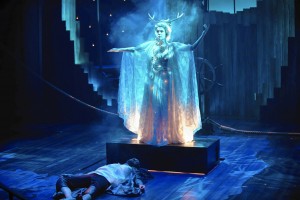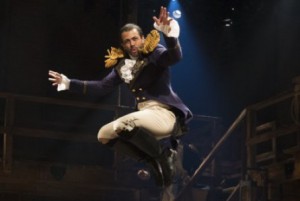 “One of the fundamental differences between extremes of Right and Left is this: in most instances hatred moves the former; fear the latter.”
“One of the fundamental differences between extremes of Right and Left is this: in most instances hatred moves the former; fear the latter.”
John Lukacs, Democracy and Populism: Fear and Hatred (courtesy of Rod Dreher)
Terry Teachout on the arts in New York City
 “One of the fundamental differences between extremes of Right and Left is this: in most instances hatred moves the former; fear the latter.”
“One of the fundamental differences between extremes of Right and Left is this: in most instances hatred moves the former; fear the latter.”
John Lukacs, Democracy and Populism: Fear and Hatred (courtesy of Rod Dreher)
In today’s Wall Street Journal drama column I review a Florida show, Orlando Shakespeare Theater’s production of a new, modernized “translation” of Pericles. Here’s an excerpt.
* * *
It’s that the 1929 film version of “The Taming of the Shrew” was credited to “William Shakespeare, with additional dialogue by Sam Taylor.” Not so, alas—that particular Hollywood tale is too good to be true—but it’s certainly the case that few Shakespeare plays are staged as written. Cuts are customary, scenes frequently rearranged. Nor is such tinkering a purely modern notion: Nineteenth-century actors often interpolated new lines and, on occasion, turned sad endings into happy ones, a practice at which no one seems to have boggled overmuch. That’s why I can’t claim to have been struck dumb with righteous horror when the Oregon Shakespeare Festival announced last fall that it had commissioned “translations” of Shakespeare’s plays into “contemporary modern English” in the hopes of making them more intelligible to today’s audiences.
I did, however, wonder why anyone thought such an undertaking useful, much less necessary. Shakespeare, after all, is the world’s most frequently performed playwright, and though the elaborate language of his plays can be intimidating and, on occasion, confusing, that doesn’t seem to stop most people from enjoying them anyway.
 Be that as it may, I chose to withhold judgment on “Play On! 36 Playwrights Translate Shakespeare” until I could see one of the translations staged by a reputable theater company. That’s what brought me to Florida last week to see Orlando Shakespeare Theater’s new production of “Pericles,” which has been “translated” by Ellen McLaughlin, a playwright with whose previous work I am unfamiliar. Not only is Orlando Shakespeare a fine company, but Jim Helsinger, the director, did exceptionally well two years ago by David Edgar’s stage version of “Nicholas Nickleby,” so I figured that he and his collaborators would make the strongest possible case for Ms. McLaughlin’s version. Sure enough, they’ve given us a superior “Pericles,” as persuasive as Terrence O’Brien’s lucid, witty 2009 Hudson Valley Shakespeare Festival staging….
Be that as it may, I chose to withhold judgment on “Play On! 36 Playwrights Translate Shakespeare” until I could see one of the translations staged by a reputable theater company. That’s what brought me to Florida last week to see Orlando Shakespeare Theater’s new production of “Pericles,” which has been “translated” by Ellen McLaughlin, a playwright with whose previous work I am unfamiliar. Not only is Orlando Shakespeare a fine company, but Jim Helsinger, the director, did exceptionally well two years ago by David Edgar’s stage version of “Nicholas Nickleby,” so I figured that he and his collaborators would make the strongest possible case for Ms. McLaughlin’s version. Sure enough, they’ve given us a superior “Pericles,” as persuasive as Terrence O’Brien’s lucid, witty 2009 Hudson Valley Shakespeare Festival staging….
Let me start off by stipulating that Ms. McLaughlin’s translation “works,” by which I mean that it’s both speakable and faithful to the meaning of Shakespeare’s text (or, rather, the text of Shakespeare and George Wilkins, the obscure 17th-century versifier who is now generally thought by scholars to have written most of the first half of the play). But she has rewritten virtually the whole of “Pericles,” stripping out the resplendently Elizabethan language and replacing it with bald, flat-footed verse that is “blank” in every sense of the word. What’s left is a watered-down text that has been systematically denuded of the rich verbal music that makes Shakespeare Shakespeare….
* * *
Read the whole thing here.
 Alfred Drake sings “Where Is the Life That Late I Led?” in the Hallmark Hall of Fame TV version of Cole Porter’s Kiss Me, Kate, directed by George Schaefer. The musical numbers were staged by Ernest Flatt. The book, by Samuel and Bella Spewack, is freely based on Shakespeare’s Taming of the Shrew. Drake created the role of Fred Graham in the show’s original 1948 Broadway production. This performance was telecast on November 20, 1958:
Alfred Drake sings “Where Is the Life That Late I Led?” in the Hallmark Hall of Fame TV version of Cole Porter’s Kiss Me, Kate, directed by George Schaefer. The musical numbers were staged by Ernest Flatt. The book, by Samuel and Bella Spewack, is freely based on Shakespeare’s Taming of the Shrew. Drake created the role of Fred Graham in the show’s original 1948 Broadway production. This performance was telecast on November 20, 1958:
(This is the latest in a series of arts-related videos that appear in this space each Monday, Wednesday, and Friday.)
Here’s my list of recommended Broadway, off-Broadway, and out-of-town shows, updated weekly. In all cases, I gave these shows favorable reviews (if sometimes qualifiedly so) in The Wall Street Journal when they opened. For more information, click on the title.
BROADWAY:
• An American in Paris (musical, G, too complex for small children, reviewed here)
• The Color Purple (musical, PG-13, many performances sold out last week, reviewed here)
• Fun Home (serious musical, PG-13, reviewed here)
 • Hamilton (musical, PG-13, all performances sold out last week, reviewed here)
• Hamilton (musical, PG-13, all performances sold out last week, reviewed here)
• The King and I (musical, G, perfect for children with well-developed attention spans, reviewed here)
• Matilda (musical, G, reviewed here)
• Les Misérables (musical, G, too long and complicated for young children, closes Sept. 4, reviewed here)
• On Your Feet! (jukebox musical, G, reviewed here)
OFF BROADWAY:
• The Fantasticks (musical, G, suitable for children capable of enjoying a love story, reviewed here)
• Prodigal Son (drama, PG-13, closes March 27, reviewed here)
• Sense & Sensibility (serious romantic comedy, G, remounting of 2014 off-Broadway production, extended through April 17, original production reviewed here)
IN SARASOTA, FLA.:
• Ah, Wilderness! (comedy, PG-13, closing April 10, reviewed here)
CLOSING SUNDAY OFF BROADWAY:
• Smart People (serious comedy, PG-13, reviewed here)
CLOSING SUNDAY ON BROADWAY:
• Noises Off (farce, PG-13, nearly all performances sold out last week, reviewed here)
 “We must grant the artist his subject, his idea, what the French call his donnée; our criticism is applied only to what he makes of it. Naturally I do not mean that we are bound to like it or find it interesting: in case we do not our course is perfectly simple–to let it alone. We may believe that of a certain idea even the most sincere novelist can make nothing at all, and the event may perfectly justify our belief; but the failure will have been a failure to execute, and it is in the execution that the fatal weakness is recorded.”
“We must grant the artist his subject, his idea, what the French call his donnée; our criticism is applied only to what he makes of it. Naturally I do not mean that we are bound to like it or find it interesting: in case we do not our course is perfectly simple–to let it alone. We may believe that of a certain idea even the most sincere novelist can make nothing at all, and the event may perfectly justify our belief; but the failure will have been a failure to execute, and it is in the execution that the fatal weakness is recorded.”
Henry James, “The Art of Fiction”
| M | T | W | T | F | S | S |
|---|---|---|---|---|---|---|
| 1 | 2 | |||||
| 3 | 4 | 5 | 6 | 7 | 8 | 9 |
| 10 | 11 | 12 | 13 | 14 | 15 | 16 |
| 17 | 18 | 19 | 20 | 21 | 22 | 23 |
| 24 | 25 | 26 | 27 | 28 | 29 | 30 |
| 31 | ||||||
An ArtsJournal Blog